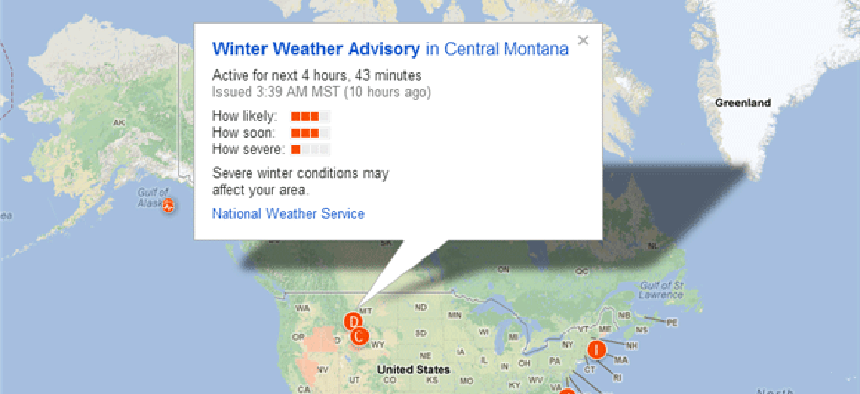Connecting state and local government leaders
Google adds weather, safety and even Amber alerts to its search and mapping applications as part of its Public Alerts service that other agencies can take part in.
Google is opening the door to public agencies that publish “authoritative alerts” to have those alerts integrated into the company’s desktop and mobile searches.
In a recent example, Amber Alerts, which raise awareness of missing and exploited children, will now pop up when a user queries related information in a particular location where a child has been recently abducted and an alert issued.
“By increasing the availability of these alerts through our services, we hope that more people will assist in the search for children featured in Amber Alerts and that the rates of safe recovery will rise,” Google software engineer Phil Coakley, part of the Google Public Alerts team, said on Google’s official blog.
The National Center for Missing and Exploited Children (NCMEC) provides the data to Google, which displays the information in Google’s Public Alerts. The Amber Alert Program is a voluntary partnership among the Justice Department, local and state law-enforcement agencies, broadcasters, transportation agencies and others to assist in solving the most serious child-abduction cases.
The alerts will provide information on the child and other available details about an abduction, such as vehicle make and model, information on the alleged abductor, and new information as it becomes available.
The new Amber Alerts are part of Google’s newly updated Public Alerts services, which currently shows emergency updates concerning weather, public safety and earthquakes from the National Weather Service and the U.S. Geological Survey.
But alerts from national agencies are the beginning. Google is open to running alerts from “agencies, domestic and international, who publish authoritative alerts,” according to the Public Alerts FAQ.
There are a few steps agencies need to take to be included:
- Get alerts into the Common Alerting Protocol (CAP 1.2) standard , an international standard for publishing and sharing alerts. While most commercial alert publishing tools already support CAP, Google also has created additional resources to help agencies with the process.
- After validating that the feeds and CAP are correct, fill and send out a contact form to Google.
- If Google deems the data a possible match for Public Alerts, it will work with the organization to integrate the data into Public Alerts.
Google has also built an Alert Hub, which aggregates alerts for alert originators and allows others to redistribute them online.
The arrival in late October of Hurricane Sandy spurred an early announcement by the company that it was bundling its Public Alerts into Google Search, Google Maps and into its Android Maps and Google Now apps on devices running the Jelly Bean OS (Android 4.1 and 4.2). The new version of Google’s Public Alerts, which has been around since January, automatically pushes the most up-to-date relevant emergency information to users when they use Google Search or Maps.
“We were planning on announcing the new features in a few days, but wanted to get them out as soon as possible so they can be helpful to people during this time,” Nigel Snoad of Google Crisis Response wrote on Google’s blog.
Hurricane Sandy, dubbed a superstorm by the media, wreaked havoc on the East Coast with hurricane-force winds, heavy rains, flooding, downed tree limbs and massive power outages.
Alerts “appear based on targeted Google searches, such as [Superstorm Sandy], or with location-based search queries like [New York],” Snoad wrote. “In addition to the alert, you’ll also see relevant response information, such as evacuation routes, crisis maps or shelter locations.”
The alerts are tailored to a user’s location, default location and settings, search query, and severity of the alert. Currently the emergency alerts are available only in the United States, but the company has plans to roll out the alerts worldwide.
“Our goal is to provide the most relevant alerts to users,” the company said in describing its Public Alerts system. Users may view all alerts by going to the Google Public Alerts homepage.



